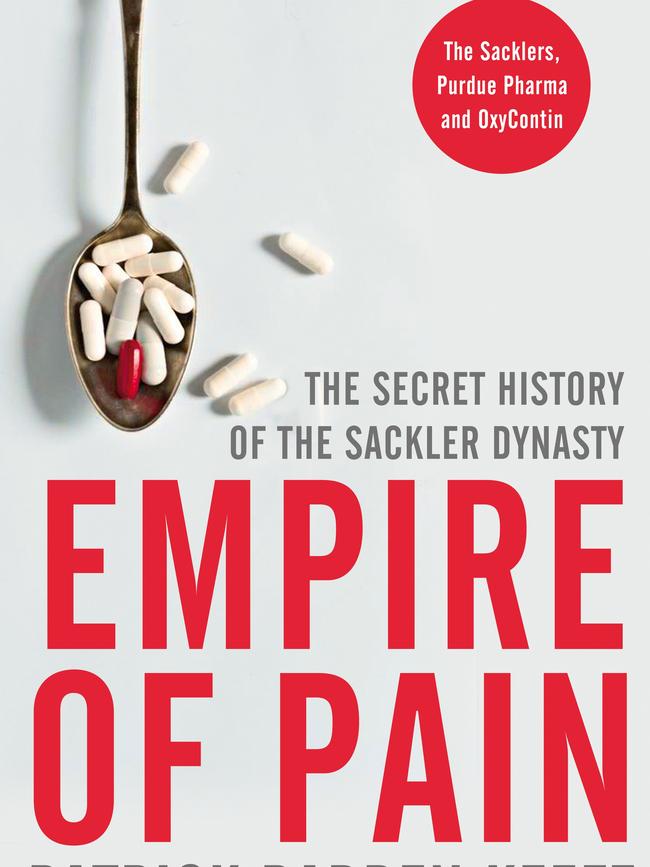The Sacklers and a deadly dynasty
The Sackler drug family’s corporate depravity hooked America on a habit of evil.

Last October, the American pharmaceutical company Purdue Pharma agreed to a $US10 billion settlement with the US Department of Justice in respect of claims it had spent two decades inflaming the public health crisis in opioids, specifically in stuffing its pioneering painkiller OxyContin down desperate and largely helpless American throats.
It sounds a lot, although the quantum will be corroded by Purdue’s bankruptcy, and needs to be measured against the crisis’s toll of approximately 400,000 lives and economic damage estimated $2 trillion. And the DOJ, notoriously lobotomised by the Trump administration, treated the matter like the redress of a mechanical defect, without apportioning personal responsibility.
“It was as if the corporation had acted autonomously,” observes New Yorker reporter Patrick Radden Keefe, “like a driverless car.”
Keefe’s concern in Empire of Pain is to examine that car more closely, and reveal, as variously its manufacturers, drivers and passengers, three generations of the family Sackler. The result is a journalistic tour de force, and much more than a saga of corporate depravity; when it comes to the Sacklers’ delusions, deceits and self-exculpations, the book crosses HBO’s Succession with Gitta Sereny’s Albert Speer: His Battle with Truth.

Keefe’s last book, Say Nothing, took a cool, shrewd look at the Troubles, in all its grey shades. Here the moralities are starker, and his asperities are sharper. One case brought against the family is “a catalogue of breathtaking venality”. One family member is “coddled and vacant-eyed, like the kind of well-upholstered young man who seems untroubled by the possibility that his only real distinction in life might be his money”.
There is a certain appealing gusto to the tale of the first generation of the Sacklers, brother Arthur, Mortimer and Raymond, striving medicos who pioneered the use of mass market advertising for drugs then branched into patent medicines by buying a down-at-heel manufacturer called Purdue Frederick in 1952.
All the same, Keefe discerns the antecedents of OxyContin in Arthur’s pathfinding promotions of the tranquillisers for Hoffman La Roche in the 1960s and 1970s, involving the same kind of indifference to fact and apathy about consequences.

OxyContin was an attempt to do for pain medication what Hoffman’s Valium and Librium had done for tranquillisers; to normalise and domesticate something dangerously addictive.
Oxy’s principal ingredient, oxycodone, is a chemical cousin of morphine, but twice as potent. Purdue’s gimmick was to wrap it in a delivery system, previously used in the cancer painkiller MS Contin, that allegedly slowed its release.
Trouble was that it did no such thing - if you crushed or chewed an OxyContin, you got a powerful morphine hit.
And even if you didn’t, its effect lasted only eight hours, against the twelve hours’ relief that Purdue claimed for it, so that patients suffered the symptoms of withdrawal daily, exacerbating their cravings, worsening the likelihood of their transitioning to illicit heroin and fentanyl.
Arthur was gone by this time, his brothers estranged. The family was constituted by their offspring, and divided behind either Raymond’s son Richard (“surly and brimming with disdain”) or Mortimer’s daughter Kathe (“brainy, brusque, entitled, socially awkward”). But they all loved Oxy, or, at least, they loved the money it made, steadily stripping Purdue of $US13 billion for their personal benefit.
Certain other themes also unite the generations. Arthur and Mortimer, each thrice-married, also established the family’s propensity for rackety personal lives. Arthur’s persecuted second wife attempted suicide in his office; Mortimer, a “gallivanting hedonist”, lost a neglected son to suicide in a haze of angel dust.
Starting with Arthur, too, the Sacklers have worked sedulously to launder their reputations by philanthropic donations to a host of institutions in the US and UK: Harvard, Columbia, Tufts, the Met, the Smithsonian, the V & A, Tate Modern, the Globe Theatre to name but a few. “Their generosity,” Keefe observes astutely, “had a conspicuously aspirational quality.”
To quote the photographer Nan Goldin, who has led a campaign against them, this effectively entailed the cultural world marrying a serial killer. One of the most stirring vignettes in Empire of Pain is at Tufts after a student campaign to chip the Sacklers’ name from their medical school, which the family unsuccessfully opposed.
Keefe puts it exquisitely: “It was a graphic measure of the Sacklers’ vanity, and their pathological denial, that the family was prepared to debase itself by trying to force its name back onto a university where the student body had said, quite explicitly, that they found it morally repugnant.”

Empire of Pain is a long book, but it’s a testimony to the rigour and vigour of Keefe’s storytelling that you leave it wanting almost a little more. What other “serial killers” might dwell in the midst of our undiscriminating charities and institutions? What can we learn from the story about the American romance with salesmanship?
Purdue aggressively targeted those regions of the US most vulnerable to their hucksterism: areas benighted by poor education, high unemployment, lousy medical infrastructure and histories of injurious manual labour. Keefe relates that the Tennessee sales team at Purdue relied for training purposes, unironically, on Alec Baldwin’s famed monologue in David Mamet’s Glengarry Glen Ross (“Always Be Closing”); a Tennessee senator, Jim Cooper, later told Kathe that was he was unaware “of any family in America that’s more evil than yours.”
There are elements in the Oxy story of the same kind of sauve qui peut libertarianism that Lehman Brothers and Bear Sterns brought to selling credit default swaps, Wells Fargo and Washington Mutual to flogging subprime mortgages, and the Republican Party to promoting Donald Trump. No wonder Trump’s DOJ was so soft on Purdue. As one source tells Keefe, the Sacklers “confused being good at something with stepping in shit and getting lucky.”
Gideon Haigh is the author of Asbestos House: The Secret History of James Hardie Industries
EMPIRE OF PAIN:
The Secret History of the Sackler Dynasty
Picador
535pp PB: $34.99

To join the conversation, please log in. Don't have an account? Register
Join the conversation, you are commenting as Logout